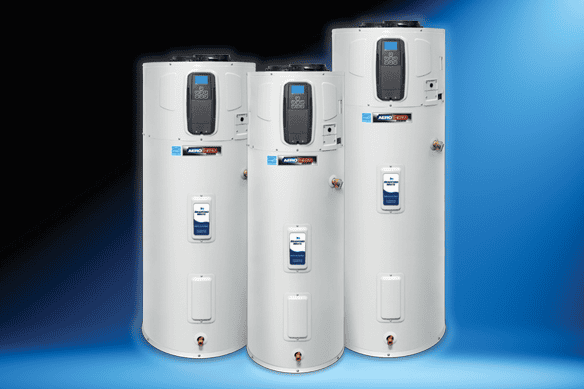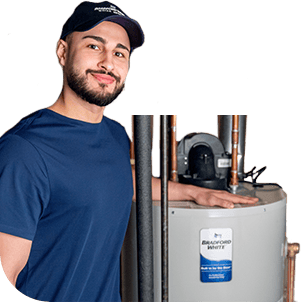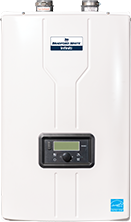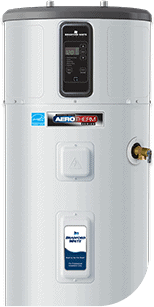The Big Question: Are Heat Pump Water Heaters Really Worth It?

Technology is revolutionizing water heaters, especially when it comes to Hybrid Electric Heat Pump Water Heaters.
But is a heat pump water heater right for you? Does the energy savings make it worth the heat pump’s higher initial cost? In this article, we’ll take a closer look at heat pump water heaters and evaluate the numbers so you can make an informed decision for your home.
How Does a Heat Pump Water Heater Work?
A heat pump water heater works like a refrigerator in reverse. It pulls heat from the air surrounding the water heater and transfers that heat to the water in the tank. Because the water heater is moving existing heat instead of just generating heat, it can operate much more efficiently than a conventional electric water heater which generates heat using resistance elements.
Does the Upfront Cost Justify the Long-Term Savings?
While heat pump water heaters are technologically advanced and can help lower your utility bills, the technology does come at a cost. A heat pump water heater can cost more than a conventional electric water heater. Some people look at the difference in initial cost and choose a conventional electric water heater. But that may be short-sighted when you consider the long-term value of a heat pump water heater. Consider:
- Significant Energy Savings: Heat pump water heaters are remarkably efficient, using up to 70% less electricity than a standard electric water heater. In the case of the new AeroTherm® Series G2 Hybrid Electric Water Heater from Bradford White, your family can expect to save $300-$600 a year in energy costs*. Over the 10-15 year lifespan of the water heater, those savings could equal thousands of dollars, which will easily offset the initial higher cost.
- Rapid Return on Investment (ROI): It’s pretty clear the heat pump water heater will effectively pay for itself in energy savings over time. But how quickly? For many households, the energy savings can pay back the higher cost in as little as three years. For the remaining life of the water heater (typically another 10-12 years), the savings will be money in your pocket!
Rebates Can Help Lower Your Initial Cost
Heat pump water heaters like the AeroTherm® G2 are ENERGY STAR® Certified, which means they’re eligible for rebates. For example:
- Local Utility Rebates: Utility companies offer their own rebates to encourage the purchase and installation of high-efficiency appliances including water heaters. These can be in the form of instant discounts or a check-by-mail.
These incentives can lower your up-front cost so you start saving money even faster! Look for available rebates in your area.
Additional Benefits of Heat Pump Water Heaters
In addition to the financial advantages, heat pump water heaters also offer consumers other key benefits:
- Caring for the Environment: Because they use less energy, heat pump water heaters are a sustainable choice.
- Built-in Dehumidification: Heat pump water heaters gently cool and dehumidify the air around the water heater. If your water heater is installed in a damp area like a basement, this could be a welcome bonus for you.
- Greater Control and Flexibility. Heat pump water heaters, like the AeroTherm® Series from Bradford White, feature multiple operating modes. This gives you unprecedented control and flexibility to your needs. You can run it in heat pump only mode for maximum efficiency, hybrid standard mode for a balance of performance and efficiency, hybrid plus mode for faster hot water recovery, electric only mode to run the water heater like a standard electric water heater, and vacation mode to conserve energy when you’re away from home.
The AeroTherm® G2 is a smart water heater with built-in Bradford White Wave™ Connectivity. If you put the Bradford White Wave™ app on your phone, you can control your water heater from anywhere! So if you’re on vacation, you can switch to vacation mode right from your phone.
Is a Heat Pump Water Heater the Right Fit for Your Home?
There are some other considerations to take into account before you commit to a heat pump water heater:
- Room for Installation: Some heat pump water heaters require a certain amount of clear space around the unit to pull in and expel air efficiently. However the new AeroTherm® Series G2 Hybrid Electric Water Heater from Bradford White can be installed with seamless retrofit, meaning it can go against the wall or even in a corner to save you valuable floor space.
- Operating Noise: Heat pump water heaters produce a low hum similar to a refrigerator which might be distracting depending where the water heater is located. (We’ve made the new AeroTherm® Series G2 Hybrid Electric Water Heater even quieter, so you might not even notice it running!)
- Installation Location and Requirements: Heat pump water heaters are the most efficient when installed in a space with a consistently warmer than usual ambient temperature such as a garage or basement compared to the rest of the living space which may be conditioned. The unit may need ductwork for both air intake and exhaust. Water condensate will need to be drained to an appropriate location. Finally, the unit will need a source of electricity. Your plumbing professional can walk you through some of these concerns.
Don’t have a plumbing professional? Search here to find a Bradford White contractor in your area.
So… Should You Choose a Heat Pump Water Heater?
If you’re choosing between a standard electric water heater and a heat pump water heater like the AeroTherm® Series G2 Hybrid Electric Water Heater from Bradford White, there are significant reasons to choose the heat pump water heater. You’ll lower your energy costs, take advantage of rebates and tax credits, help protect the environment, and enjoy outstanding hot water performance for you and your family.
If you have questions about the cost, operation, or advantages of a heat pump water heater, ask your plumbing professional. They can look at your family’s hot water needs and determine the best option for you.
*Actual savings will vary based on usage, location, utility rates and model gallon capacity.


